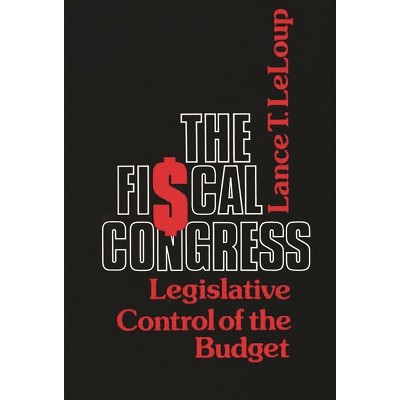Sponsored

Managing Fiscal Strain in Major American Cities - (Contributions in Political Science) by William Pammer (Hardcover)
In Stock
Sponsored
About this item
Highlights
- This study offers frank evaluations and a pro-and-con analysis of various retrenchment strategies.
- About the Author: WILLIAM J. PAMMER, JR., is Assistant Director in the Center for Urban and Public Affairs and an Assistant Professor of Urban Affairs at Wright State University.
- 151 Pages
- Freedom + Security / Law Enforcement, General
- Series Name: Contributions in Political Science
Description
About the Book
This study offers frank evaluations and a pro-and-con analysis of various retrenchment strategies. It focuses specifically on how environmental conditions and administrative and political aspects of cities affect the decisions to implement specific retrenchment strategies during periods of revenue decline or stagnation. The book takes the reader beyond the rationalistic and incremental approach of urban decision-making and demonstrates that decisions requiring fiscal retrenchment can be confusing and ill-planned. It also reveals how any action taken by the city will reflect the chief executive officer's perception of what the situation demands.
The first part of the book, The Evolution of Financial Decline, discusses the structural antecedents that have contributed to the decline of financial sources. Here, the major literature that investigates the causes and consequences of urban fiscal strain is reviewed. In Part Two, Reacting Toward Fiscal Stress, the chapters deal specifically with different management techniques available to municipalities to cope with resource decline. The strategic advantages and political ramifications of these approaches are discussed in detail. These chapters also provide an inventory of response techniques for urban managers. Part Three, Retrenchment and the Urban Policy Process, builds upon the garbage can model developed by March and Simon by proposing that the retrenchment process is haphazard and random. The book concludes with some considerations of what happens to the urban policy process during periods of resource scarcity. This book should appeal to anyone interested in public administration, urban studies or political science.
Book Synopsis
This study offers frank evaluations and a pro-and-con analysis of various retrenchment strategies. It focuses specifically on how environmental conditions and administrative and political aspects of cities affect the decisions to implement specific retrenchment strategies during periods of revenue decline or stagnation. The book takes the reader beyond the rationalistic and incremental approach of urban decision-making and demonstrates that decisions requiring fiscal retrenchment can be confusing and ill-planned. It also reveals how any action taken by the city will reflect the chief executive officer's perception of what the situation demands.
The first part of the book, The Evolution of Financial Decline, discusses the structural antecedents that have contributed to the decline of financial sources. Here, the major literature that investigates the causes and consequences of urban fiscal strain is reviewed. In Part Two, Reacting Toward Fiscal Stress, the chapters deal specifically with different management techniques available to municipalities to cope with resource decline. The strategic advantages and political ramifications of these approaches are discussed in detail. These chapters also provide an inventory of response techniques for urban managers. Part Three, Retrenchment and the Urban Policy Process, builds upon the garbage can model developed by March and Simon by proposing that the retrenchment process is haphazard and random. The book concludes with some considerations of what happens to the urban policy process during periods of resource scarcity. This book should appeal to anyone interested in public administration, urban studies or political science.Review Quotes
?The book is definitely worth reading and will be a great service to those interested in these issues.?-Choice
?This book offers frank evaluations and a pro-and-con analysis of various retrenchment strategies. It focuses on how environmental conditions and administrative and political aspects of cities affect the decisions to implement specific retrenchment strategies during periods of revenue decline or stagnation. The book goes beyond the rationalistic and incremental approach of urban decision-making and demonstrates that decisions requiring fiscal retrenchment can be confusing and ill-planned.?-RPGP
?This volume attempts evaluations and a pro-and-con analysis of various retrenchment strategies, focusing specifically on how environmental conditions and administrative and political aspects of cities affect the decisions to implement specific retrenchment strategies during periods of revenue decline or stagnation. An attempt is made to go beyond the rationalistic and incremental approach of urban decision making to demonstrate that decisions requiring fiscal retrenchment can be confusing and ill-planned. Any action taken by the city will reflect, it is argued, the chief executive officer's perception of what the situation demands. The book leads off with a discussion of the structural antecedents that have contributed to the decline of financial sources. The book then goes on to deal with different management techniques available to municipalities to cope with resource decline. The strategic advantages and political ramifications of these approaches are discussed. An inventory of response techniques for urban managers is also provided. The book continues with an argument, building upon the garbage can model, that the retrenchment process is haphazard and random. The book concludes with considerations of what happens to the urban policy process during periods of resource scarcity.?-Sage Urban Studies Abstracts
"The book is definitely worth reading and will be a great service to those interested in these issues."-Choice
"This book offers frank evaluations and a pro-and-con analysis of various retrenchment strategies. It focuses on how environmental conditions and administrative and political aspects of cities affect the decisions to implement specific retrenchment strategies during periods of revenue decline or stagnation. The book goes beyond the rationalistic and incremental approach of urban decision-making and demonstrates that decisions requiring fiscal retrenchment can be confusing and ill-planned."-RPGP
"This volume attempts evaluations and a pro-and-con analysis of various retrenchment strategies, focusing specifically on how environmental conditions and administrative and political aspects of cities affect the decisions to implement specific retrenchment strategies during periods of revenue decline or stagnation. An attempt is made to go beyond the rationalistic and incremental approach of urban decision making to demonstrate that decisions requiring fiscal retrenchment can be confusing and ill-planned. Any action taken by the city will reflect, it is argued, the chief executive officer's perception of what the situation demands. The book leads off with a discussion of the structural antecedents that have contributed to the decline of financial sources. The book then goes on to deal with different management techniques available to municipalities to cope with resource decline. The strategic advantages and political ramifications of these approaches are discussed. An inventory of response techniques for urban managers is also provided. The book continues with an argument, building upon the garbage can model, that the retrenchment process is haphazard and random. The book concludes with considerations of what happens to the urban policy process during periods of resource scarcity."-Sage Urban Studies Abstracts
About the Author
WILLIAM J. PAMMER, JR., is Assistant Director in the Center for Urban and Public Affairs and an Assistant Professor of Urban Affairs at Wright State University. He is the co-author of Ambush Related Assaults on Police: Violence at the Street Level.Shipping details
Return details
Frequently bought together


Trending Non-Fiction















